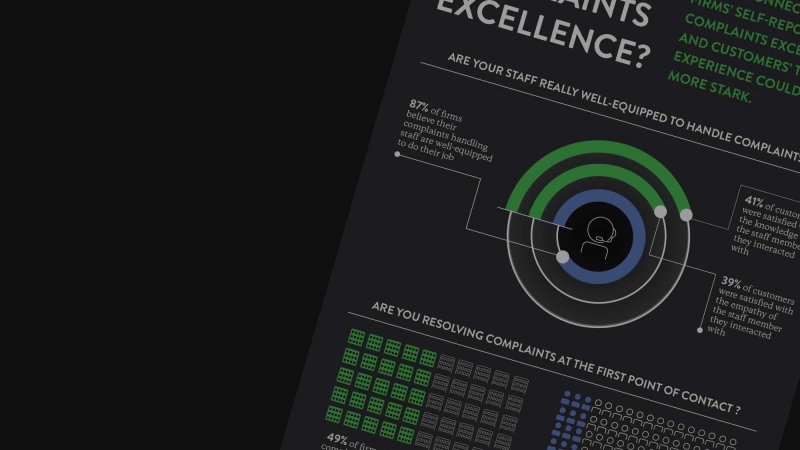Posted: 25th September 2019
We all know that the world of regulated business is becoming more complex and demanding, and that unpredictable and uncontrollable events can result in a catastrophic cascade of issues.
In this age of tech-enabled innovation and disruption of industry, businesses need to be well-prepared for technical failures, operational stress and surges in customer contact. Otherwise, they risk regulatory repercussions or, worse yet, losing previously loyal customers to competitors.
The findings of our Complaints Outlook 2019 reveal that there has been a marked increase in our reliance on digital technology for managing our day-to-day lives. It also found that more than 1 in 10 complaints are now made off the back of systems failures or data breaches.
If 70% of complaints are triggered by the severity of the issue, firms hit with a disastrous system failure can easily find themselves overwhelmed not just by the issue itself, but by increased contact and complaints from frustrated customers. And if (again, according to the research) your customers are now more likely to switch to one of your competitors than give you a chance to put things right, there are real commercial risks to not considering operational continuity.
Organisations across every sector are now investing more into the embedding of capabilities, processes, behaviours and systems that will allow them to adapt to rapidly changing business conditions and withstand the shock of system issues. Businesses that can’t bounce back quickly from such issues will find their customers going elsewhere.
But are firms acting fast enough? Do they have the contingency resource, technology and processes in place that will allow them to continue delivering at times of peak operational stress?
BUILD RESILIENCE NOW TO MINIMISE IMPACT
During periods of operational stress or system failure, firms need to ensure that they have a highly skilled team, effective processes and appropriate back-up systems in place to maintain service levels.
To minimise the impact of operational issues, firms should:
- Audit the technology, processes and people within your firm to understand their impact to the operation, then invest in capabilities and governance across these areas
- Ensure the business, from senior management to the frontline, embraces a culture of ‘prevention over cure’ and considers resilience in all activities
- Consider partnering with third-party providers of contingency resource and put in place resourcing solutions that ensure your operation can rapidly respond to fluctuations in contact volume
Firms need to take a proactive approach to meeting changing regulator and customer expectations. There are many opportunities to strengthen operational resilience and ensure continuity by taking a more end-to-end view of key business operations and being honest about where failings can occur.
Not having effective systems and controls in place means your firm risks regulatory repercussions – from Ombudsman upholds to more supervisory actions. These would only add to the stress on your operation. Failing to satisfy customers at all times will also mean your firm faces high levels of churn and little to no return on the investments made in resolving customer issues.
INVEST IN COMMUNICATIONS CHANNELS BEFORE OPERATIONAL ISSUES STRIKE
For a long time, customers have had a ‘channel of choice’ that applies to all interactions they have with their chosen business. For example, they could prefer to get in touch by picking up the phone, or they could be serial emailers.
Our recent research, however, shows that the end-to-end customer contact journey is unlikely to take place in one channel nowadays. Customers will, instead, use multiple channels during this process, with an expectation of seamless transition between them. Firms will thus need to enable a flow of data across the business and between various customer contact teams so that the customer will only ever have to supply information once.
Because of this, firms will have to invest in the delivery of a multi-channel experience that is resistant to fluctuations and disruptions.
It also probably goes without saying that the usage of new media channels will increase significantly in the coming decade. More customers will own devices that support innovative forms of communication and software that enables more efficient complaint / issue lodging. Managing these channels will make the job all the more complex, especially since customers frequently change their preferences.
A seamless and consistent customer experience is necessary for business continuity and to create good customer outcomes following an operational issue. Communication channels such as webchat and automated updates (think of your phone’s ‘push notifications’) are areas where technology solutions could be integrated for immediate impact.
Your business needs to have discussions about this now, and begin investing in the teams, processes and technologies that will allow them to continue delivering communications across as many channels as possible. This will only boost your chances of bouncing back from a catastrophic failure of one or more systems. If you can communicate with customers via multiple channels, you ensure that you will always have an option should the worst happen.
CUSTOMER-CENTRIC CONTINUITY
Customers should be central to any business consideration, and implementing technologies that maintain or improve the customer experience during times of operational stress can reap many benefits. Such technology, when implemented correctly, will allow you to keep servicing customers effectively during even the worst issues.
Firms can make use of robotics and automated techniques to simplify manual data gathering across systems, for example. This would allow skilled case handlers to have more valuable conversations with all the information they need at hand. The positive snowball effect of this is that customers will have more confidence in their case handler’s abilities, and quicker decisions will be made. Speed of resolution will be even more important following operational issues.
How customers’ issues are dealt with remains the key driver of any firm’s success, and in periods of extreme operational stress, resolving them quickly will help you ‘keep your head above water’.
Ensuring customer contact teams have the right skills and resource to deliver excellence in all forms of contact is even more important during times of high emotional impact for customers. Our research into complaints, for example, shows that the empathy and knowledge of complaints handlers and the speed at which they resolve complaints has a substantial impact on customer satisfaction.
Being able to deliver for customers, and ensure their satisfaction, even in the midst of a technological failure or operational crisis is the mark of a truly resilient firm with effective, customer-centric continuity planning at its core.
And it is these businesses that will surely be sticking around during the technological revolution we’re now seeing.
Technology is offering firms innovative ways to add value, reduce the costs of complaints handling and increase customer retention. Our Complaints Outlook 2019 is the ‘go-to’ report for delivering complaints excellence, providing firms with a solid roadmap to success in this and other areas. Download your free copy today.







